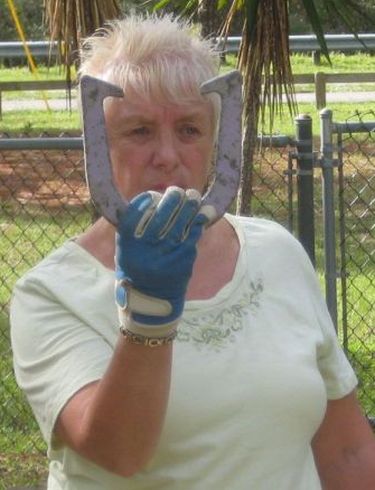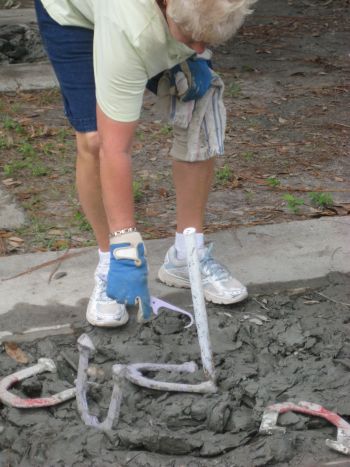Brevard County Horseshoe Club Pitches Camaraderie
By Robert Hughes // March 3, 2013
Simple Game Transforming For Many

BREVARD COUNTY, FLORIDA – Clank! Even if you haven’t been near a horseshoe pit since you were a kid, the sound of a horseshoe hitting a target stake is unmistakable.
And in Wickham Park on Sunday and Wednesday mornings, it’s something you hear a lot, as Brevard County Horseshoe Club members play the ancient sport.

Friendship
Some of the horseshoe “pitchers” produce solid ringers more than others, but it’s clear their events are more about camaraderie than competition, as there’s another familiar sound: The banter.
“Oh, you’re just lucky, lucky, lucky,” says one pitcher whose opponent bounced a ringer off the clay.
“You damn right,” says the other.
And “I’m pretending I’m playing bocce-ball,” comes from Vinnie Germann, whose horseshoe slipped and skipped its way toward its target.
That was followed shortly by Ron Fournier exclaiming, “I almost got a Vinnie!” when he nearly got a ringer off another bounce.
Such kidding around has probably gone on since the first time some farmer picked up a loose horseshoe and tossed it at something and his buddy said he could do better.
Practically everybody has played the game at some point, and some – like Ed Boggess – have gotten back into it more seriously.

Perfect combination
“I started playing in the backyard, like everybody else, I guess,” Boggess said. “Then I didn’t play for a long time until my doctor suggested some exercise. And this (horseshoes) seems to fit the bill perfectly: There’s a lot of walking, physical movement, and some mental challenge, too.”
Horseshoes has always been popular because of its simplicity, but that doesn’t mean it’s easy.
Clang-uh-clang-uh-clang-uh! That’s another sound you hear from the horseshoe pits.
It can come from a horseshoe falling short of the clay pit, bouncing off cement or wood and perhaps into the stake before it clangs into the back wall and maybe back into the pit again. Even if it lands around the stake, it doesn’t count if it hits anywhere outside the pit first, so errant pitches score zero.
Such a poor toss draws even more banter, but it’s often self-directed.
“Oh c’mon Steve, you can do better than that,” moans a pitcher named Steve.
But there’s also plenty of encouragement to go around.

Encouragement
“Wow! Way to go! Somebody had their Wheaties this morning!” one cheers as Lana Gerber gets another Clank.
To which she responds, “Yeah, I’m going for a six-pack.”
Gerber wasn’t talking about beer, however. She was talking about the maximum points you can get from the two throws you get in each of the 40 rounds you get in each of four games of a match: That is, two ringers, which score three points each.
Gerber, a former state champion in Connecticut, knows a lot about ringers — and a thing or two about how to get good at this game.
“Everybody got good because we were playing for beer,” she quipped. “At least, that’s how I started.”
Even with sharp pitchers like Gerber, the club manages to even out the playing field to a large extent with handicaps based on a scoring system where one point is scored for every non-ringer horseshoe that’s within six inches of the stake, as well as the three you get for ringers.

Scoring
“We score it that way so everyone can have a handicap,” Phil Kibling of Palm Bay said. “That way, it evens things out. A poor player can beat a good one sometimes because of his handicap.”
All of the players carry short measuring sticks that quickly gauge whether a toss really is a ringer or is within six inches of the stake. And some carry longer pick-up-sticks that help them avoid bending over to fetch their horseshoes every time.
“I don’t use one, because I want (the bending) to be part of my exercise,” Boggess said.
In addition, at the end of each 40-pitch game, players use shovels to beat on the hard gray clay that serves as the pit around the stake. They knock some of the bigger lumps out, but it remains pretty lumpy. A smooth service would induce tossed horseshoes to just skip away too fast to stand much chance of landing near the stake.
The result is a grayish mass that looks like lava that hasn’t quite cooled yet. And it gets watered down to soften it, to induce horseshoes to not bounce too far away on contact.

Simple to play
“It’s deceivingly simple,” Kibling said. “It’s a finesse game more than physical; it takes brain-body coordination.”
Even with their handicapping system, the local club is a genuine hotbed for the sport of horseshoes, producing state champions on a regular basis, so there are a good number of experts that can help any newcomers to the game.
Brevard County Horseshoe Club members encourage anybody to come and give the sport a try at 10 a.m. for Wednesday’s informal games and for Sunday’s more focused competitions at Wickham Park in Melbourne. Club members, who carry their own horseshoes to events, have plenty for newcomers to use.
“It won’t cost them anything, and there’s no pressure to join,” member Jim Smith said.
The club has about 70 members who range in age from 12 to over 80, but only about a dozen players of retirement age come to the events regularly these days, with more to come in the colder months.
Public invited
Club president Duane Raeburn said, “We’re always looking for more people to come and try the game and mingle with us.”
And, he could have added, kid each other about their handicaps.
Raeburn said the club has lost players in recent years to one of the horseshoe game’s many imitators — Cornhole.
Cornhole has one advantage over the traditional horseshoes game, in that soft beanbags are tossed rather than hard horseshoes. And that’s an advantage particularly as players throw down beer and get less accurate.
However, that game surely will never be the same because it just doesn’t have that: Clank!
The Brevard County Horseshoe Club has a permanent playing site set up just east of Wickham Park’s main office building, where it hosts regular tournaments as well as less formal play. It also has a facility in Stradley Park in Cocoa, where organized play starts at 6:30 p.m. on Thursdays.
For more information, go to the club website, http://brevardhc.9f.com/, or call Duane Raeburn at 321-501-9992 or by e-mail at dcraebrun@cfl.rr.com.













